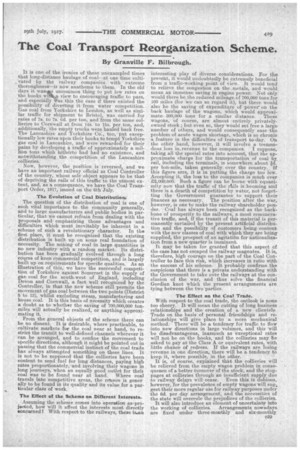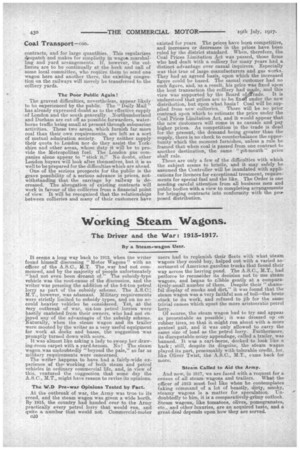The Coal Transport Reorganization Scheme.
Page 5

Page 6

If you've noticed an error in this article please click here to report it so we can fix it.
By Granville F. Bilbrough.
• It is one of the ironies of these unexampled times that long-distance haulage of coal—at one time cultivated by the railway companies with extreme thoroughness—is now anathema to them. In the old days it waso uncommon thing to put low rates on 1 1
the books w a view to encouraging traffic to pass, and especially as this the case if there existed the 1‘444; :possibility of diverting it from water competition. Gas coal from Yorkshire to London, as well as similar traffic for shipment to Bristol, was carried for rates of 7s. to 7s. 6d. per ton, and from the same collieries to Cornwall at from 148. to 158. per ton, and, additionally, the empty trucks were hauled back free. The Lancashire and Yorkshire Col, too, put exceptionally low rates upon their books to tempt Yorkshire gas coal in Lancashire, and were rewarded for their pains by developing a traffic of approximately a million tons which hitherto had had no existence, and notwithstanding the competition of the Lancashire
collieries. , Now, however, the position is reversed, and we have an important railway official as Coal Controller of the country, whose sole object appears to be that of depriving the rails of this traffic to the utmost extent, and, as a consequence, we have the Coal Transport Order, 1917, issued on the 6th July.
The Evolution of Coal Distributionc The question of the distribution of coal is one of such vital importance to the community generally, and to large manufacturers and public bodies in particular, that we cannot refrain from dealing with the proposals and emphasizing those advantages and difficulties which must inevitably be inherent in a scheme of such a revolutionary character. In the . first place, it must be recognized that the existing distribution is built up on some real foundation of necessity. The mining of coal in large quantities is no new industry with a random market. Its distribution has been ,gradually evolved through a long course of keen commercial competition, and is largely built up on requirements for specific qualities. As an illustration of this, we have the successful competition of Yorkshire against Somerset in the supply of .gas coal for the south-west of England, including Devon and Cornwall, a fact well recognized by the Controller, in that the new scheme still permits the , movement of gas coal between the two points (District 5 to 13), whilst excluding steam, manufacturing and house coal. It is this basis of necessity which creates a doubt as to whether the saving of 700,000,000 tonmiles will actually be realized, or anything approximating it. From the general objects of the scheme there can be no dissent. It is desirable, where practicable, to cultivate markets for the coal near at hand, to restrict the transit to well-defined channels wherever it can be arranged, and to confine the movement to specific directions, although it might be pointed out in passing that the commercial instinct of the coal trade has always attempted something on these lines. It is not to be supposed that the collieries have been content to send fuel for long distances, paYing high rates proportionately,-and involving their wagons in
long journeys, when an equally good outlet for their coal was to be found near at hand. Where coal travels into competitive areas, the reason is gener ally to be found in its quality and its value for a particular class of work.
The Effect of the Scheme on Different Interests.
Assuming the scheme comes into operation as-projected, how will it affect the interests most directly concerned? With respect to the railways, them issan interesting play of diverse considerations. For the present, it would undoubtedly be extremely beneficial from a traffic-working point of view. It would tend to relieve the congestion on the metals, and would mean an immense saving in engine power. Not only would there be the reduced nailea,ge of 700,000 tons for 100 miles (for we can so regard it), but there would also be the saving of expenditure of power on the back haulage of the wagons, which would approximate 300,000 tops for a similar distance. These wagons, of course, are almost entirely privatelyowned stock ; but even so, they would set free a large number of others, and would consequently ease the problem of acute wagon shortage, which is so chronic a feature in the difficulties of transport to-day. On the other hand, however, it will involve a tremendous loss in, revenue to the companies. I suppose, taking all the special rates into account, that the approximate charge for the transportation of coal by rail,_ including the terminals is somewhere about id. per ton-mile, taken generally over the country. If this figure errs, it is in putting the charge too low. Accepting it, the loss to the companies is much over 22,000;000. Such a figure can be borne with equanimity now that the traffic of the Ails is .booming and there is a dearth of competition by water, not forgetting the Government guarantee to support their finances, as necessary. The position after the war, however, is one to make the railway shareholder ponder. Coal has always been recognized as the backbone of prosperity to the railways, a most remunerative traffic, and, If the transit of this material is permanently curtailed by the present artificial distribution and the possibility of customers being content with the new classes of coal with which they are being supplied, the prospect of an agitation for nationalization from a new quarter is imminent. It may be taken for granted that this aspect of the case has not escaped the railway magnates. It is, therefore, high courage on the part of the Coal Controller to face this risk, which increases in ratio with the success of his scheme. It probably confirms the suspicions that there is a private understanding with the Government to take over the railways at the conclusion of the war, and thus solve the financial Gordian knot which the present arrangements are tying between the two parties.
The Effect on the Coal Trade.
With respect to the coal trade, the outlook is none too cheery. It will mean the cutting of long business relationships and the creation of a new clientele Trade on the basis of personal friendships and relationships will give place to a more mechanical method.. There will be a tendency for traffic to flow into new directions in large volumes, and this will be disadvantageous, inasmuch as exceptional rates will not be on the books, and the collieries may be asked to pay at the Class A or equivalent rates, with little chance of redress. If the railways are losing
• revenue in one direction, there will be a tendency to keep it, where possible, in the other.
It is, of course, explained that the collieries will be relieved from the empty wagon problem in consequence of a better turnover of the stock, and the stoppages at collieries through an insufficient supply duo to railway delays willcease. Even this is dubious, however, for the prevalence of empty wagons will suge gest their more regular use for railway purposes under the 6d. per day arrangement, and the necessities of the state will overrule the prejudices of the collieries. It Vill also introduce an element of uncertaintT into the working of collieries. • Arrangements nowadays are fixed under three-monthly and six-monthly.
contracts, and for large quantities. This regularizes despatch and makes for simplicity in wagon marshalling and yard arrangements. If, however, the collieries are to be continually at the beck and call of some local committee who require them to send one wagon here and another there, the existing congestion on the railways will merely be transferred to the colliery yards.
The Poor Public Again: The gravest difficulties, nevertheless, appear likely to be experienced by the public. The "Daily Mall" has already expressed doubt as to the effective supply of London and the south generally. Northumberland and Durham are cut off as possible forwarders, waterborne traffic being small at present through submarine activities. These two areas, which furnish far more coal than their own requirements, are left as a sort of mutual admiration society. They neither supply their quota to London nor do they assist the Yorkshire and other areas, whose duty it will be to provide the Metropolitan fuel. The London gas companies alone appear to "stick it." No doubt, other London buyers will look after themselves, but it is as well to be prepared for the difficulties which are ahead. One of the serious prospects for the public is the grave possibility of a serious advance in prices, notwithstanding that the carriage by railway is decreased. The abrogation of existing contracts will work in favour of the collieries from a financial point of view. It will be recognized that the relationships between collieries and many of their customers have existed for years. The prices have been competitive, and increases or decreases in the prices have been ruled by the district standard. When, therefore, the Coal Prices Limitation Act was passed, those firms who had dealt with a colliery for many years had a distinct advantage over casual inquirers. Especially was this true of large .manufacturers and gas works. They had an agreed basia, upon which the increased figure could be based. The casual customer had no such figure, and, as a result, his price was fixed upon the best transaction the colliery had made, and this view was supported by the Board ofa/rade. It is understood that prices are to be fixoff under the new distribution, but upon what basis? Coal will be supplied from new collieries. There will be no prior contract upon which to estimate the price under the Coal Prices Limitation Act, and it would appear that the new customers will come in as casuals and pay higher prices. As competition in the trade is dead for the present, the demand being greater than the supply, there is no check to counterbalance the opportunity which the moment furnishes, unless a rule he framed that when coal is passed from one contract to another destination, the same " pit-mouth " price shall rule.
These are only a few of the difficulties with which the subject seems to bristle, and it may safely be assumed the Controller will be inundated with applications for licences for exceptional treatment, requirements for special fuel and the like. The Order is one needing careful attention from all business men and public bodiea with a view to completing arrangements for bringing contracts into conformity with the proposed distribution.




















